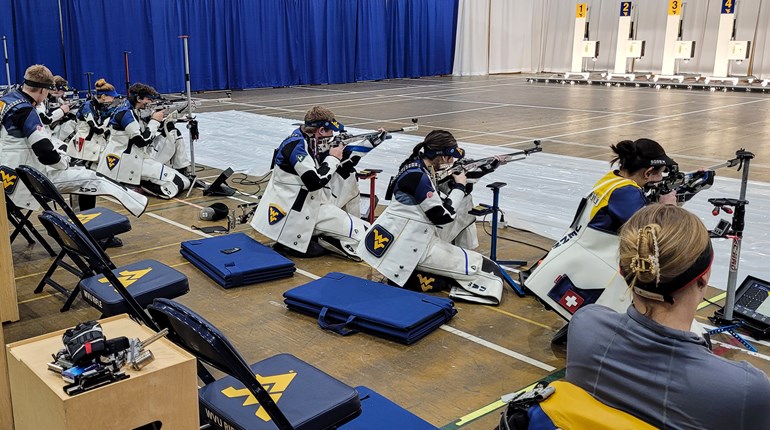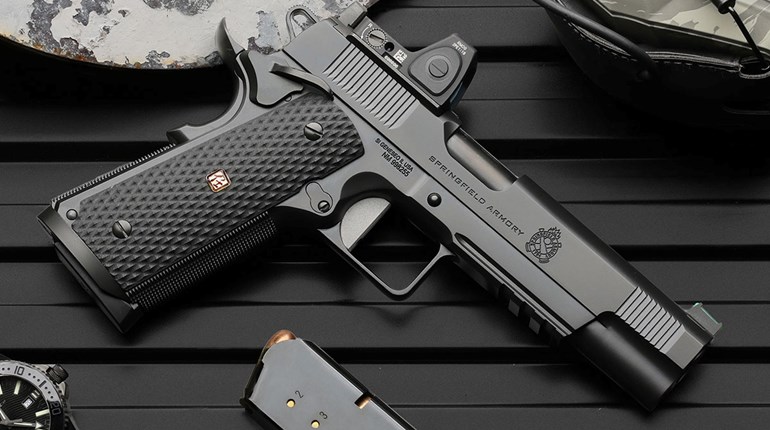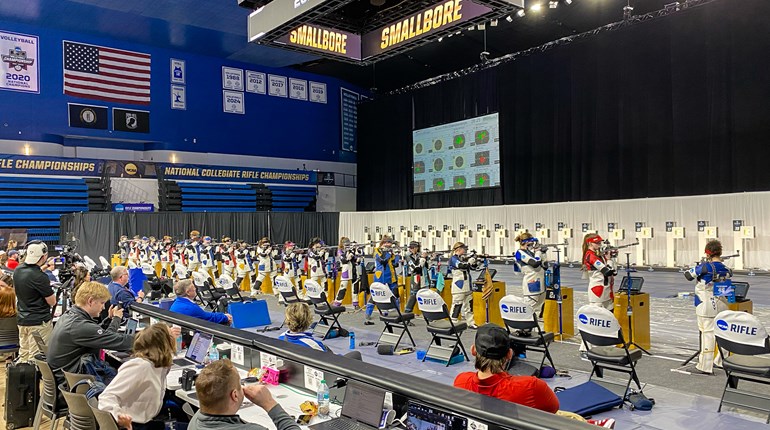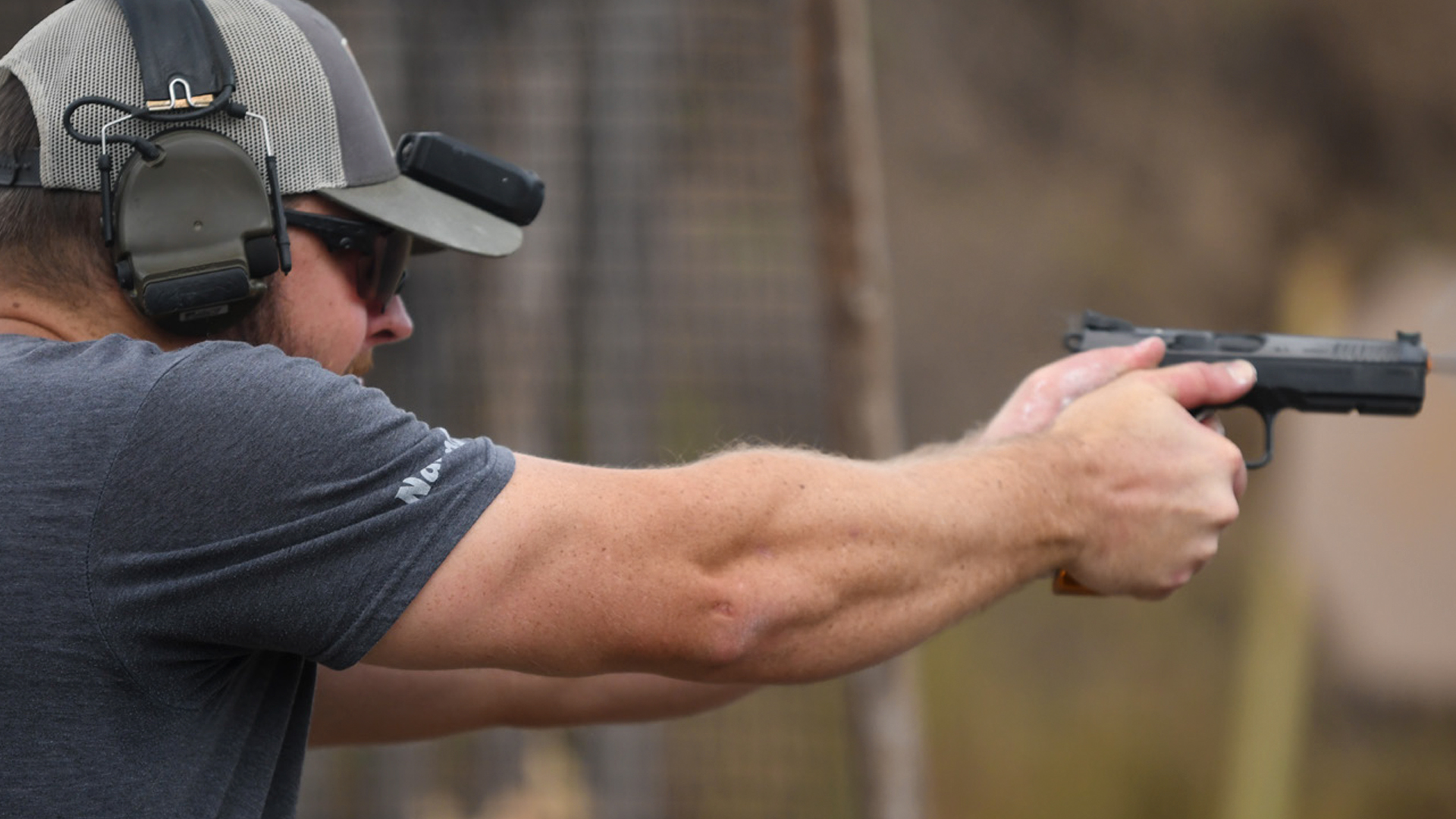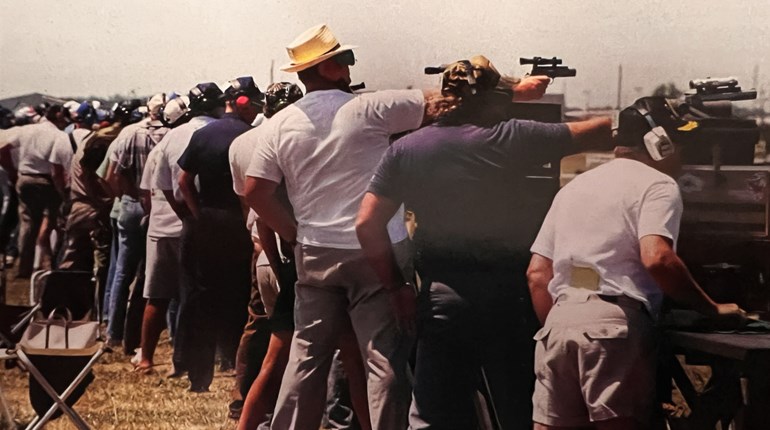
When SSUSA last talked to Bruce Piatt, he had just competed for the first time at Camp Perry. A retired New Jersey police officer, Piatt has won more than 50 professional world and national shooting championship titles over a 30-year career in the sport, including five NRA Bianchi Cup National Action Pistol Championships, five SOF Tactical 3-Gun World Championships, and three USPSA Multi-Gun National Championships. Additionally, Piatt was the 2015 NRA World Shooting Champion.

Always dedicated to the shooting sports, in 1973 Piatt earned his NRA Pro-Marksman Qualification for rifle, and has been a life member since 1988—proof positive that NRA programs are a great path for shooters that can lead to championship wins—if they put in the time and effort. In January during the SHOT Show, we sat down with the longtime action shooter to see what’s new for him in 2017.
Upcoming matches
When we asked him about his upcoming schedule, Piatt said: “I plan to shoot the Bianchi Cup and as much 3-Gun as possible in 2017. I’m going to try to do Precision Pistol at Camp Perry. I’ve bought a new house and I plan to build a range with the full Bianchi Cup set-up on the property. I’ll even have my own Mover. That’s my dream, be able to work on my gun, then go outside and shoot it on my own range!”
Piatt is excited that the Multi-Gun Aggregate will be returning for the 2017 Bianchi Cup. However, he has a compelling argument about why the winner of the Multi-Gun Aggregate should be the Bianchi Cup Champion.
“I think the actual Bianchi Cup should go to the Aggregate winner—just like every other NRA pistol discipline. In PPC, you have to shoot semi-auto and revolver—two guns—to be the champion. There is a semi-auto champion and a revolver champion, but the winner of the entire event is the Aggregate winner. It’s the same with NRA Precision Pistol; there’s a rimfire, centerfire and .45 cal. champion—but the national champion has to shoot all three guns to win the entire event. That’s the true measure of who can shoot the best. NRA Action Pistol is the only one that is different.”

To sharpen his skills before the Bianchi Cup, Piatt will be attending the Crawfish Cup in April. “The Crawfish Cup NRA Action Pistol Regional is now the place to warm up prior to Bianchi Cup. It’s in late April, so it’s no too close to the Cup. You can attend, then you have a few weeks to fiddle with your gun if you need to before Bianchi. A lot of the top shooters attend—the U.S. Army Marksmanship Unit (AMU), Carl Bernosky, Doug Koenig, Kevin Angstadt, Tony Holmes, etc. Great sponsors have opened a lot of doors for the Crawfish Cup.”
In addition to his usual schedule, Piatt was asked to be on the USPSA team at the upcoming IPSC Rifle World Championship held in Moscow, Russia this June. “Even if I don’t win, I’m excited to go to Russia and see the Red Square! I’m on the standard team, which is iron sights only.”
This year, Piatt will be shooting the Christensen Arms CA-15 3G rifle. Designed specifically for competition, the CA-15 has all the features that Piatt values in a competition rifle—such as a carbon fiber barrel with a titanium side-baffle brake, and a full-length carbon fiber handguard. All that lovely carbon fiber allows for a total weight of just under 6-lbs.
IPSC targets can be as small as 4-inch squares, and shooting is limited to 300 meters. The typical IPSC World Championship comprises 30 stages—so Bruce and his teammates have their work cut out for them. Joining Piatt in Russia on the USPSA team are Tyler Payne, Daniel Horner and Joel Turner of the AMU, as well as the Miculek family, among others.
Piatt’s custom 1911 build classes

Piatt also keeps busy as a gunsmithing instructor, holding custom 1911 build classes across the country. “I really enjoy teaching classes. It’s a lot of fun for me and everyone involved.” Students come out of Piatt’s class with a very thorough understanding of the operation of the 1911. Piatt emphasizes this. “I teach them how they work, why they work, and how each part works with each other. That way when something doesn’t work on not only their own gun, but other guns, they can fix it.”
Last year, Piatt conducted five of his world-class custom 1911 build classes. He told us, “Four of those cities we held classes in 2016 were repeat cities. Once the word gets out and people show off the pistol they built, more people get interested and attend. Lots of smiles, and surprisingly—I have a lot of repeat students. I keep changing the format, but people come take the class again to build another gun.” Piatt plans to hold eight classes in 2017.
The class includes five full days of instruction. Students start with a required Caspian frame and slide, and a box of 1911 parts that don’t fit. Every single part is then custom fit for the pistol. Piatt added, “Everybody has fun in the class. If you are signing up for a class like this you’re a gizmo type of person. They gain a new appreciation of why a custom gun is very expensive, because now they are putting all this effort into their own gun. Some students build guns to go out and compete with, but others want to make a showpiece presentation gun that is going to sit in a box and remain in pristine condition. I get to see a wide scale of what they are doing with the guns, some are used a lot, and other ones remain perfect.”
Training the AMU Action Pistol team

When the AMU’s Precision Pistol team decided to compete in NRA Action Pistol, they needed an expert to help them learn the sport. Piatt, well-known for his willingness to help anyone at the range, made himself available to help the team at the practice range before the cup that year. “I gave the AMU pointers before the Bianchi Cup—like I do for anyone else practicing at Green Valley. Then, I got a call asking if I would be interested in conducting a training session with the team. A few months later we were training in Columbia.”
His longevity in the discipline surely helped the AMU decide on Piatt as an instructor. “While it looks easy on paper, it’s not easy to transition to Action Pistol from other sports. It’s an odd mix of speed and accuracy that demands its own approach.”













